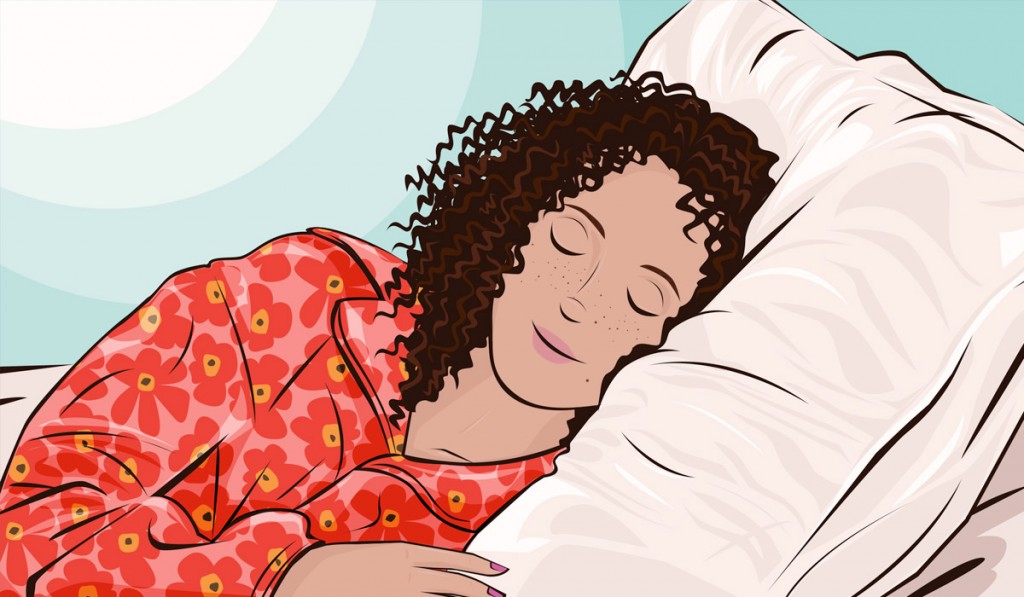
How Women Can Sleep Better At Night Naturally
Why are women more tired than men? How can you get a better sleep naturally? Is sleep really all that important? How can I wake up without feeling groggy? Let’s take a look.
- Women Report Feeling Tired More Than Men
- Heads Up: Fatigue Can’t Always Be Solved By Better Sleep
- Why Fixing Your Sleep Is Worth The Effort
- How Women Can Get Better Sleep
- Exercise regularly
- Bright Days And Dark Nights Brings Great Sleep
- Bright light During The Day Sets You Up For Sleep
- The Color Of Light Will Change Our Melatonin Output
- Amber And Yellow Light Is Best After The Sunset
- After The Sunset, Turn Off The Overhead Lights
- Black Out Your Bedroom With Curtains
- Keep Your Bedroom Cool But Not Cold
- Gear Down At Night With Low-Stress Activities
- Get In Bed Early Enough
- High-Tech: Set Your Thermostat To Warm Up Between 3–7 a.m
- High-Tech: Use Timed Bright Lights To Wake Up
Women Report Feeling Tired More Than Men
You’ve got some serious goals. Some are fitness related, some aren’t. You know what you want to do, and you might even know how to do it… but you don’t quite feel like tackling it right now. Carpe Diem Cras—seize the day tomorrow. That’s what they say, right?
It’s not just you. It’s pretty normal to feel too tired to take on new challenges. The Center for Disease Control (CDC) says women between the ages of 18 and 44 are nearly 2x as likely as men to report feeling very tired or exhausted.
Top 5 Reasons Women Are Tired
In another survey taken at a women’s health symposium, fatigue was rated as the number one and most common health concern. When asked why they thought they were tired, the five most common responses in order were:
- working both at home and at work
- poor sleep
- lack of time for themselves
- lack of exercise
- financial worries
Maybe you’ve got something in common with the women above, feeling like you haven’t slept well in weeks.
Unfortunately, those “5 quick tips for a better sleep” articles likely won’t help with your energy woes. That’s just clickbait, not a solution that properly addresses the root of the issue.
We’re going to cover the three best research-backed ways to actually improve your sleep, energy, wakefulness, alertness, and performance in the short and long-term. They might not be the sexiest or simplest solutions out there, but they’re very thorough, healthy, effective, and long-lasting.
Heads Up: Fatigue Can’t Always Be Solved By Better Sleep
Anemia Is A Common Reason For Female Fatigue
If you’re feeling overly or chronically tired, that could signal an underlying health concern. For example, the World Health Organization writes that iron is the most common nutritional deficiency in the world, and this deficiency is especially common among long-distance runners and vegetarians/vegans. An iron deficiency can cause anemia, and anemia can cause fatigue (study, study, study).
If you’re now thinking, “I’m a vegathon runner. That must be it. I should take iron pills.”—not so fast! First, elemental iron pills don’t get absorbed in the body the same way as iron from food, especially animal-based foods, such as from a nice steak. Second, it isn’t a great ideal to supplement blindly. These kinds of health issues are best dealt with by visiting a medical professional.
If you’re feeling relatively healthy though—and keep in mind that low energy is the most common health concern among healthy women—onwards and upwards!
Why Fixing Your Sleep Is Worth The Effort
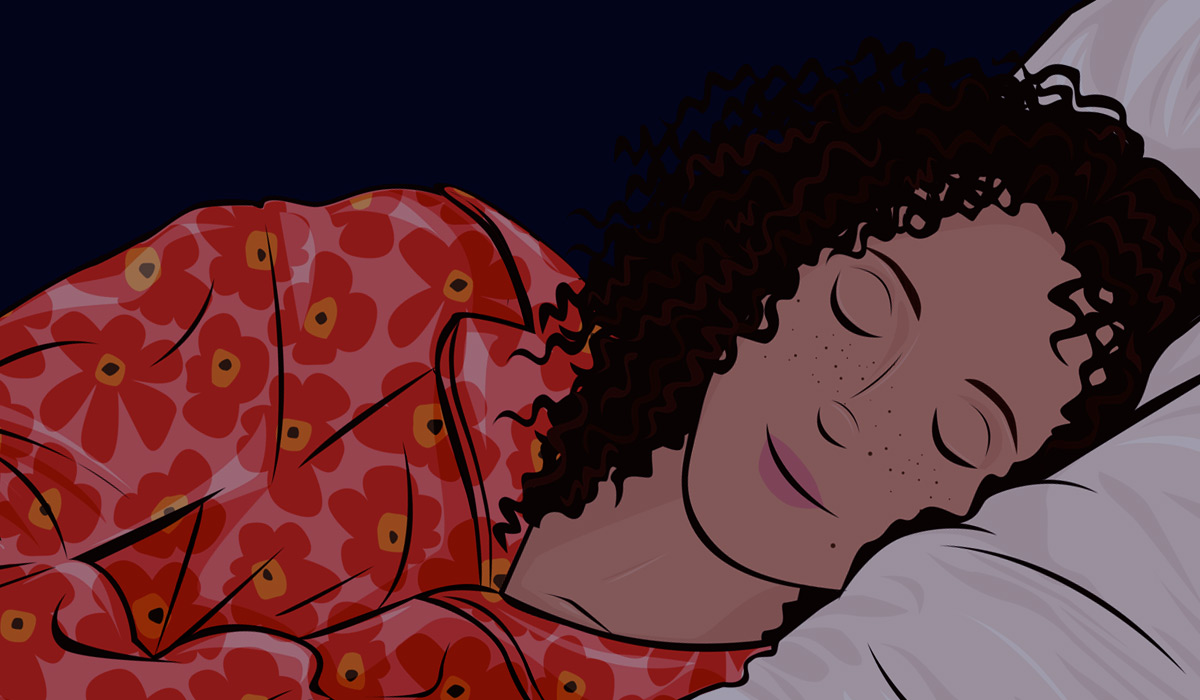
While we don’t fully understand why we sleep, we have a good idea of what sleep can affect. We all know that not sleeping well will mean feeling tired and low energy the next day, but that’s just the beginning.
The Science Of Why We Need Good Sleep
- You’ll have a harder time building muscle (study).
- You’ll gain fat more quickly (study, study, study)
- You’ll have less willpower to make good decisions and to manage your mood. (Willpower, 2012)
- Your skin will age faster (study), and you’ll look worse (study).
- You’ll be less morally aware (study).
- You won’t be able to learn new things as well. (article, study, study)
- You’ll be less creative. (study, article)
- Your risk increases for a ton of diseases, such as: strokes, obesity, heart attacks, and cancer. (study, study)
- Your immune system will be weakened. (study, study)
What Does Getting A Good Sleep Mean?
Now that you’re a bit more motivated to get some quality zzz’s, what exactly does it mean to get a good sleep? Experts define good sleep as when you fall asleep easily, do not fully wake up at night, do not wake up too early, and feel fully refreshed in the morning (article).
Doesn’t that sound like a dream come true?
Most of us could improve our sleeping routine to either help fall asleep better or wake up better—or both. But first, we should understand how our natural sleep rhythm works. You’ll often hear people simplify this wakefulness/sleepiness cycle down to just our circadian rhythm, but there’s a lot more to it than that.
Natural Sleep Rhythms
Two systems work together to control our wakefulness: our sleep drive and our biological clock. While we go about our day, our sleep drive accumulates. While we sleep, the sleep drive is reset.
If this system existed on its own, we’d gradually become less alert over the course of the day. However, we’re typically quite alert in the evening—even after being awake for a dozen hours. Our second system, the biological clock, counterbalances our sleep drive. At certain points of the day, it pumps us full of alertness. This biological clock and the systems it runs (including our circadian rhythm) allow us to feel alert even as the day wears on (article).
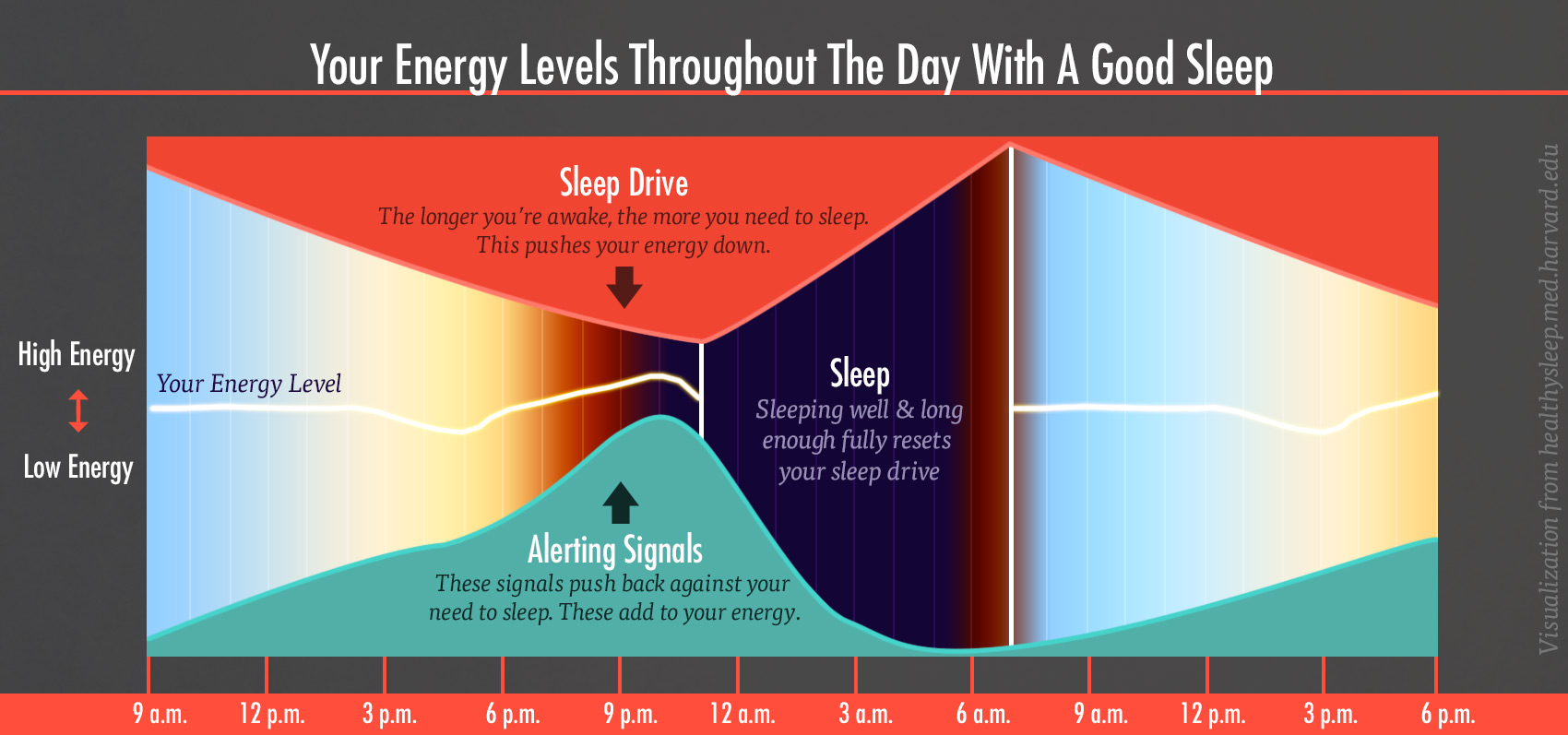
Now let’s run a few scenarios. When you stay up late Sunday night and need to wake up early Monday morning for work, your body doesn’t get the required sleep, so your sleep drive isn’t fully depleted.
Since you’ve still got some lingering sleep drive right when you wake up, this makes you feel sleepy all day. Your biological clock will still send out alertness signals. Still, because your sleep drive will be stronger than normal, the alerting signals can’t fully counterbalance it making you feel lower energy and tired.
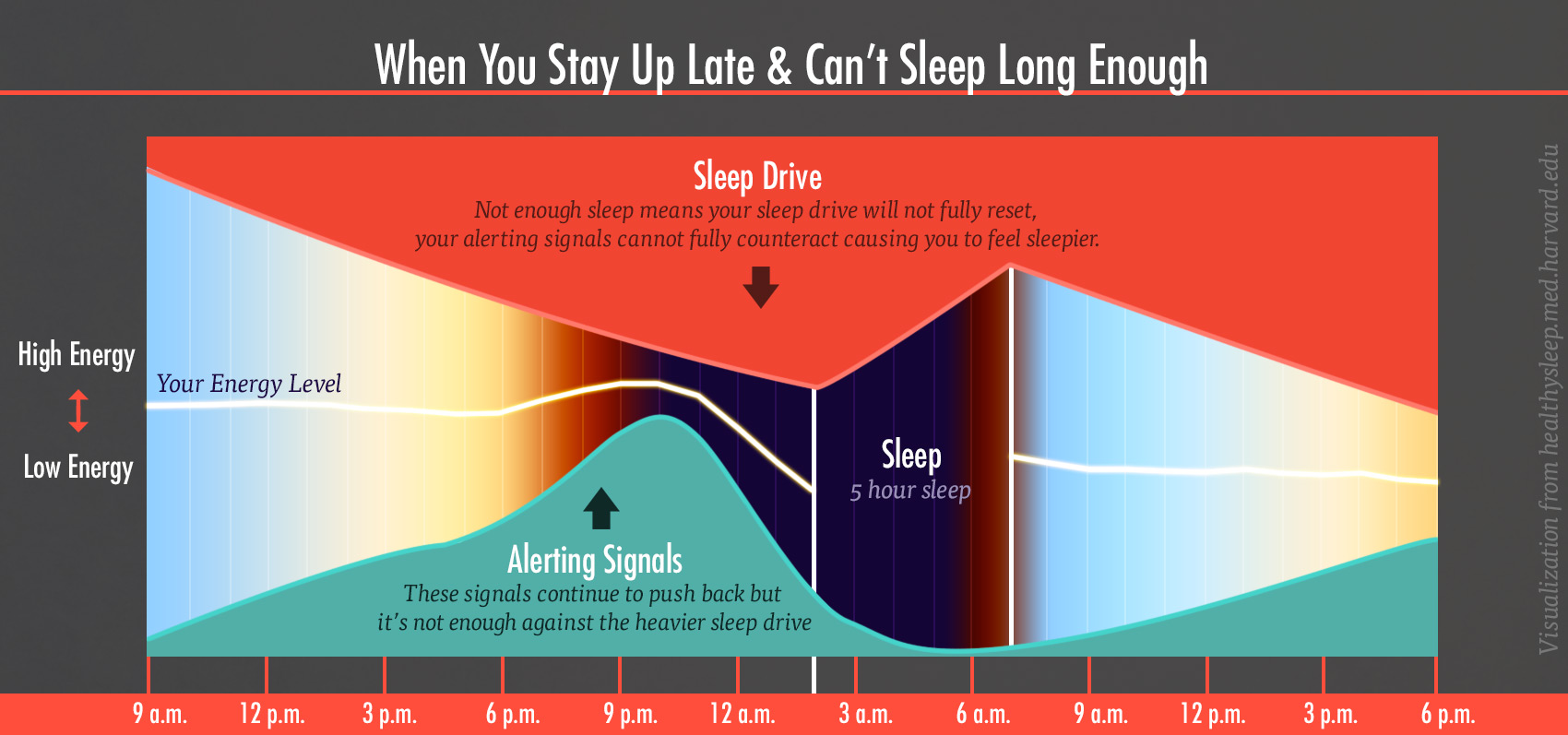
After a long exhausting week, the kind where it feels like you just can’t quite catch up, you’ll sleep in Saturday and Sunday morning to fully clear your sleep drive. But sleeping in will delay your biological clock, and the alerting signals that make you feel awake won’t start firing until later in the day.
If this system doesn’t start early enough, it’ll be hard to feel fully awake during the day… and by the time you do feel awake, you should be getting to sleep so you can sleep long enough for the next day. Since you’re not tired, you stay up late, rob yourself of sleep, and curse the alarm clock at 6:30 a.m.
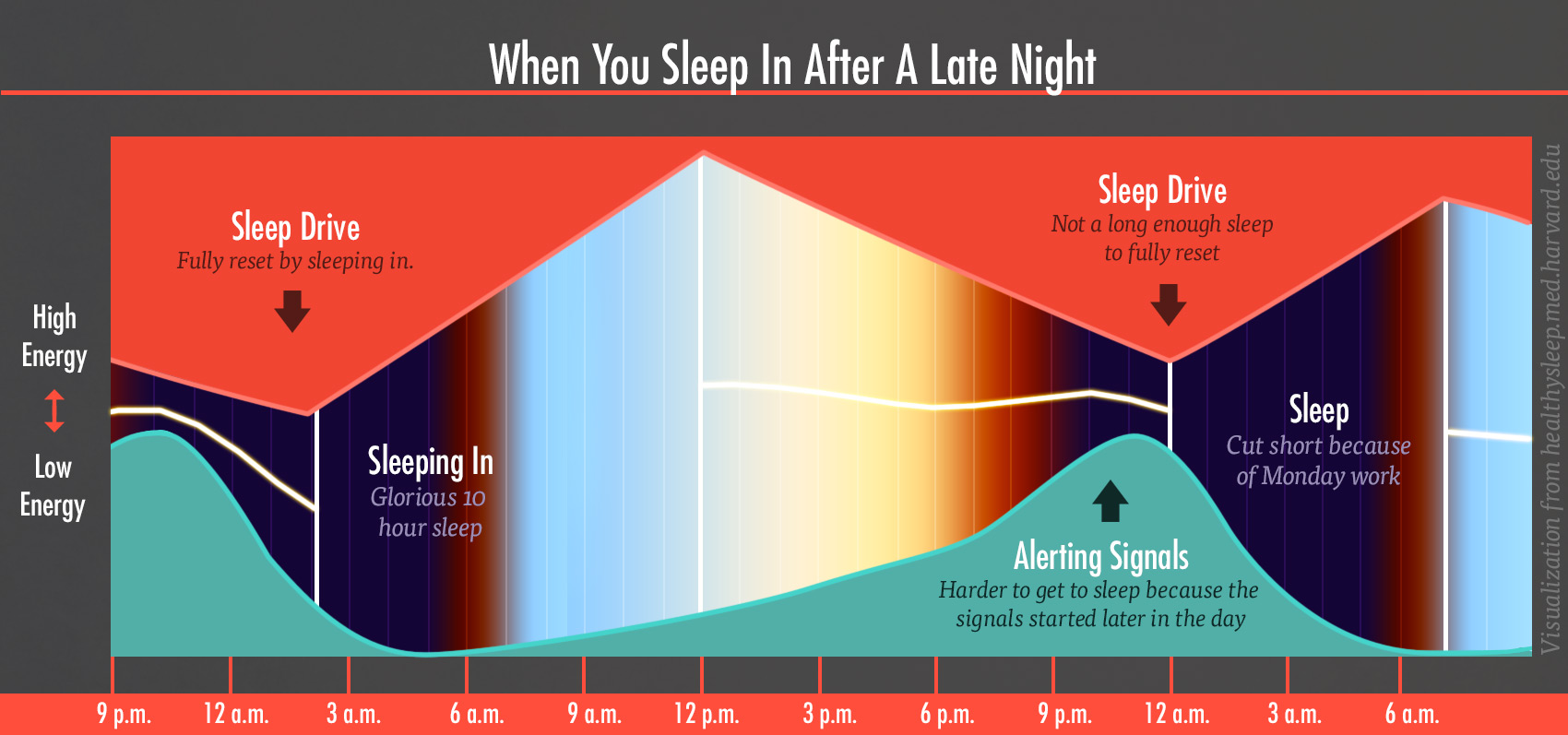
Then the cycle repeats. When it comes to sleep, you can feel tired in the morning for a couple of reasons:
- Lingering sleep drive. Not getting enough quality sleep that your body requires.
- Mistimed biological clock signals. Not waking up fully because the alerting signals from your biological clock aren’t in sync with the day.
Why does all this matter? Because it’ll help you figure out how to adjust your sleep habits.
How Women Can Get Better Sleep
Exercise regularly
Studies show that moderate exercise has us waking up feeling more refreshed, improves our mood and vitality, and improves our sleep quality. Exercise is the most inexpensive and simple way of improving our sleep, and the risk of negative side effects is very small (study, study).
Lifting weights is great because muscle is so incredibly healthy (article), it’s fun and rewarding to build strength, it can be great cardiovascular exercise, and more muscle will help you look better—all while helping you get to sleep.
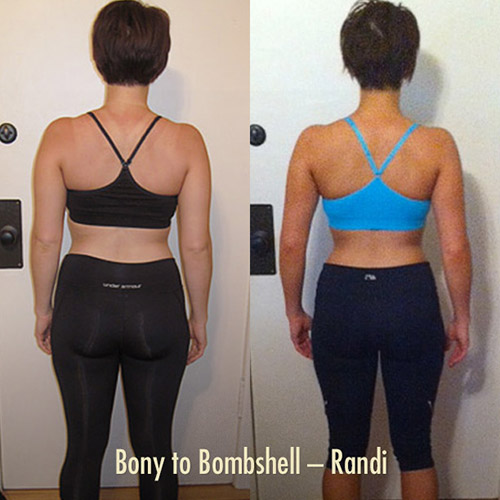
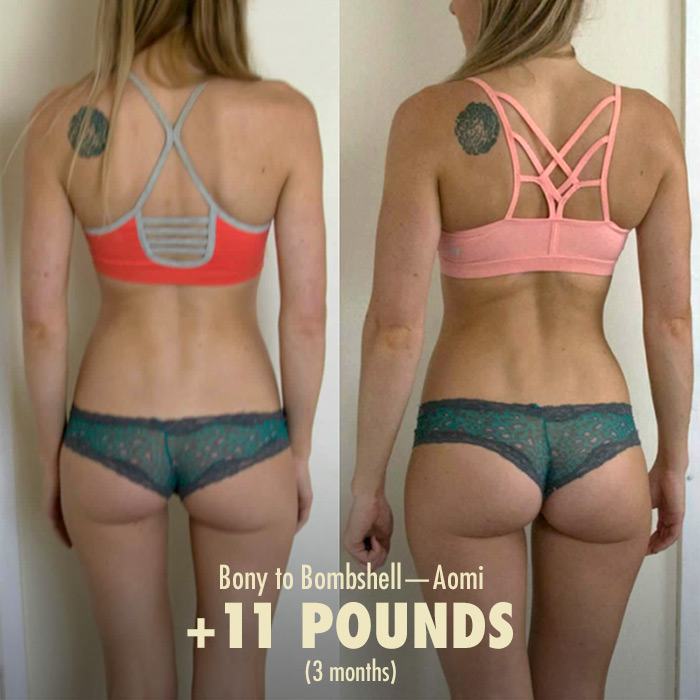
Doing things that raise your heart rate is healthy too. Swimming, biking, walking uphill, playing some casual sports, etc. If you aren’t getting enough cardio from your weightlifting routine (or you aren’t lifting weights) you might want to do some other types of cardio, too.
Bright Days And Dark Nights Brings Great Sleep
You probably already know that the sun can improve your health by getting your vitamin D production going, but it also helps us program our biological clock.
We use the bright “blue” light from the sun to signal to us that it’s daytime—awake time. This kickstarts our biological clock and gets those alerting signals firing, boosting serotonin/melatonin levels (article).
Serotonin in our body is affected by exposure to daylight (among other things, like exercise). Moderately high levels of serotonin help put you in a positive mood, so it’s often called the “happiness hormone” (alongside endorphins, dopamine and oxytocin). The sun will help you feel energized and amazing in general.
Researchers have found that light levels outside on a summer day can be 1000x brighter than typical indoor lighting (article). Generations ago, most people worldwide were farmers. We’re not just talking about tropical farming, either. Even on a cloudy day in the middle of a cold winter here in Canada, a farmer would have been exposed to more than 1000 lux—far brighter than indoor lighting.
In a recent study analyzing how much sunlight people were exposed to at the latitude of 45° N. Some examples of cities at 45°N-50°N are Montreal, Ottawa, Portland, Lyon, Paris, Milan, Venice, Vienna, Munich, etc.
Researchers found that people were exposed to 1000+ lux for just 30 minutes a day during the winter, and 90 minutes in the summer. These were regular people leaving the house and working at least 30 hours a week.
Today, the amount of bright light people got during the summer is considerably less than what our great-grandparents would have gotten in the winter (article).
We’re starting to finally understand that we’re living in a “light deprived society” and we’re feeling the consequences with poor sleep. Some clever entrepreneurs have used this as a business opportunity and are opening up shops to address the problem, like the “light cafe” in Sweden (link).
Bright light During The Day Sets You Up For Sleep
When you’re exposed to very bright light during the day, your melatonin production starts sooner, which means you enter into sleep more easily at night. Getting bright morning light is helpful against insomnia and seasonal affective disorder (SAD).
If you work inside all day or you live in a high-latitude country, you should consider making an effort to get some more bright light during the day (and ask your medical professional if you’re getting enough vitamin D).
The Color Of Light Will Change Our Melatonin Output
Aside from brightness, the colour temperature (the hue) from the sun also helps signal to our body that it’s daytime. During the day sunlight has a blue colour of light. Because we’re used to seeing things outside, blue-coloured light gives us the most accurate colour depiction. This is why all of our computer screens, TVs and iPads are emitting blue light. This blue light is wonderful during the day, but troublesome at night. Exposure to this type of light, when it isn’t daytime, throws off our biological clock and keeps us awake at night.
You can see how this is a problem. Let’s say you do some late-night texting, TV watching or computer using. Then you remember, even though you’re not that tired, that you need to wake up early. You head to bed, but you have trouble falling asleep. So maybe you whip out your iPad in bed to occupy yourself instead of just lying there waiting. One study found that just reading on your iPad before bed, because of the light, can delay your sleep by as much as an hour and cause you to feel sleepier in the morning (study).
Amber And Yellow Light Is Best After The Sunset
Just like with blue light, our bodies think that it’s daytime, amber and yellow coloured light—sunsets, fires, candles—tell our bodies that that the day is over. This stops the alerting signals from your biological clock and allows your body to start preparing to fall asleep.
So if you need to use your laptop at night, you can switch the colour it emits. F.lux is a free app that will slowly change the colour of your screen to become more yellow with the sunset outside (based on your timezone).
If you read until you fall asleep, either read a paper book or use a lightless e-ink reader with a very dim amber/yellow table lamp or clip-on LED light.
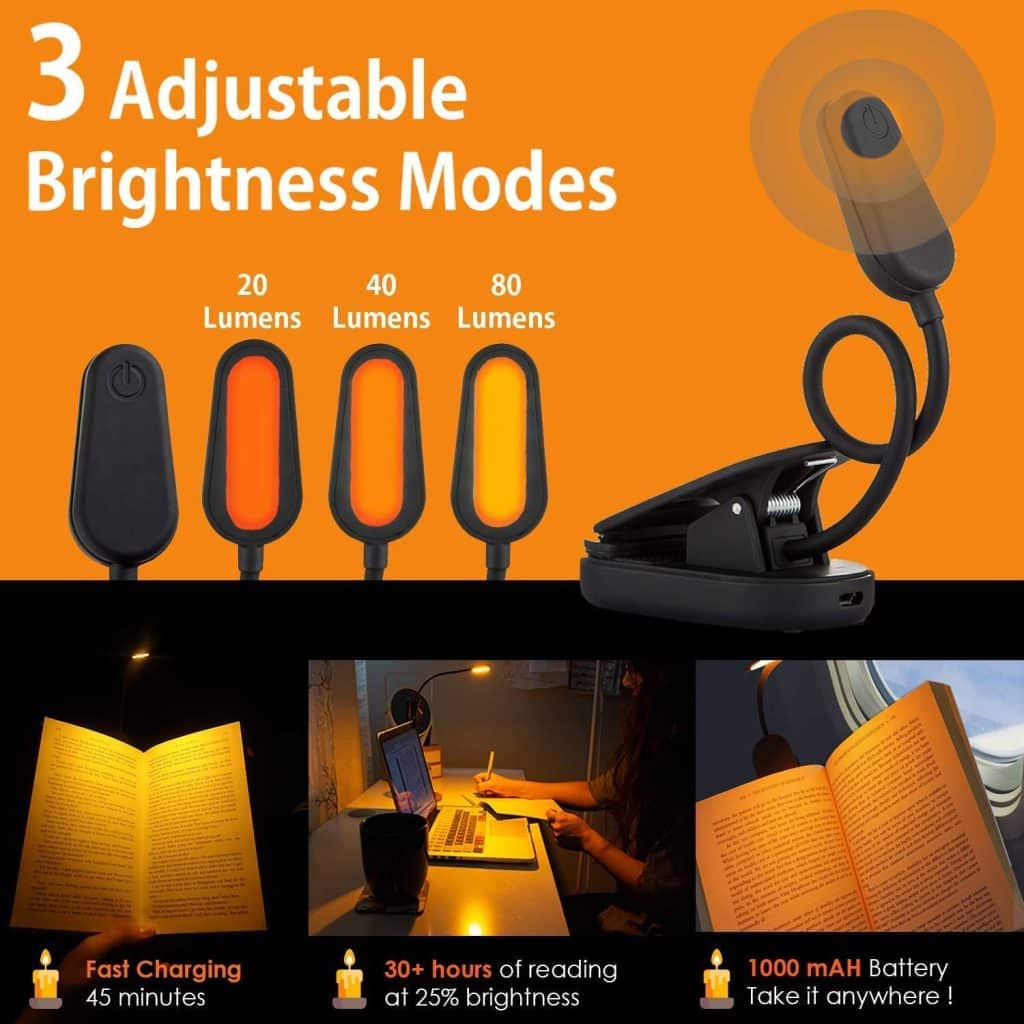
If you watch TV at night to help gear into bed, things get trickier. You still have some options, but they’re a bit weird…
You can use amber/yellow tinted glasses (e.g. Gunnar glasses) like Bono or cut and place a yellow acetate sheet to fit on your TV. If you don’t want to turn your TV into an arts and crafts project, you might also have some luck adjusting the picture settings to give your TV a more yellowish hue and a dimmer backlight. … or promise yourself that you’ll only watch darkly lit low-key crime scene shows.
After The Sunset, Turn Off The Overhead Lights
As you near your bedtime, start turning off your overhead lights in your house your lights. Turn on your table lamps.
When you brush your teeth and wash your face, use a dim or amber-tinted nightlight instead of turning on your regular bright bathroom lights. If you’ve got (quite) a few bucks to spare, you could even outfit your place with Philips Hue lightbulbs, which can be controlled by your phone and programmed to dim and change colour temperature at night.
Black Out Your Bedroom With Curtains
During a blackout in ’94, many Los Angelites called local emergency centres to report strange lights in the sky. Sadly, none knew they were staring at the beautiful Milky Way… If you want an idea of what LA is “supposed” to look like, check out these photos.
If you live in the city, I can pretty much guarantee that you’re getting a ton of light “pollution”—light that is bright enough that it’s telling your body that it’s still daytime.
Even those living in rural areas can be unlucky enough to have a street lamp outside their house. To get a truly restful sleep, you might need to black out your bedroom with curtains or blinds.
When I lived in downtown Toronto, even with all the lights off, the outdoor street lights were bright enough that I was casting shadows in my room.
Keep Your Bedroom Cool But Not Cold
Researchers think we’re partial to going to bed at dusk and waking at dawn partly because of the temperature changes. During the day, our bodies associate heat with daytime. During the night, the temperature falls, so our bodies use it as a cue that we should be gearing down for bed. When your core temperature lowers, it becomes easier to fall asleep and stay asleep. While either too cold or too hot will disrupt your sleep, being too cold will ruin your sleep the most (study).
It’s hard to recommend an ideal temperature that works for everyone because of the variations in genetics, health, age, body-fat levels, and even the humidity of the room. However, one study claims that room temperature between 16-19C (60-66 Fahrenheit) is perfect with pajamas and at least one sheet, so that’s a good starting point. It’s best to use some sort of sheets or blankets because it helps protect you from changes in the environment, allowing you to stay asleep (study).
When you’re a couple of hours away from trying to fall asleep and ready to start gearing down, that’s when you should lower the temperature of the room.
Gear Down At Night With Low-Stress Activities
According to the National Institute of Health, people report that it’s easier to sleep when they have time to wind down into a less active state (PDF).
- Having a hot bath with dead sea salts
- Drinking warm caffeine-free tea with some honey
- Reading with an amber light
One type of tea seems particularly effective: chamomile tea. Traditionally it’s been used as a sedative to improve sleep, and recently two double-blinded studies have shown that having chamomile tea before bed improves sleep, reduces anxiety (in people who struggle with poor sleep and high anxiety) and seems to improve a few different health markers. Research still hasn’t pinpointed why it had these effects, but it seems like there’s something to it (study).
Get In Bed Early Enough
This one will require some serious self-control. In Willpower, co-written by the famous researcher Roy Baumeister, they wrote that we only get a small amount of willpower each day. If we want to capitalize on it truly, then the best thing we can do is to use that willpower to carve out enough time to sleep. Netflix isn’t watching out for how many hours of sleep you get each night.
High-Tech: Set Your Thermostat To Warm Up Between 3–7 a.m
One study found increasing the temperature 3 C between 3–7 a.m. helped the sleepers wake up feeling fresh (study). Heat promotes wakefulness and gets us out of deep sleep (REM and slow wave sleep), easing us into waking up.
I personally tried this for a week or so and found the heat was waking me up too early. If you decide to try this, you may want to experiment with the timing based on exactly when you want to wake up.
High-Tech: Use Timed Bright Lights To Wake Up
After you wake up, you’ll want to be exposed to bright lights and get moving as soon as possible. One of the best ways to do this is to go for a quick walk outside in the morning.
The light outdoors will always be much stronger than indoors and will let your body know that it’s daytime, causing it to send out wakefulness signals, and the movement will help too.
It’s helpful to be exposed to bright light as you’re waking up to remove that groggy feeling. Assuming you’ve done your best to black out your room, you’ve got a few options. If you’ve got money to spend, you could look into timer-controlled curtains or blinds that open automatically.
Personally, I’m surprised that this is something currently only marketed toward the rich. It seems like it’ll only be a matter of time until Ikea comes out with cheap motors and timers for their blinds. But for now, unless your money is burning a hole in your pocket or you’re a DIY programmer, you might need to use a regular ol’ alarm clock, groggily open your blinds (before hitting the snooze button), and immediately go for a walk outside.
If you have a bit of money to invest into making your morning a little cheerier but don’t want to go full out with the automatic blinds (or perish the thought, you need to wake up before the sun does), the Philips Wake Up Light will gradually turn from amber to blue while getting brighter to wake you up softly. You can also buy timers that you can plug an ordinary lamp into.
Remember, a dose of bright blue light beats out caffeine for boosting alertness and cognitive function! (study) Get outside bright and early, or at least blast yourself with some bright lighting.
PS If you liked this article, you’d love our muscle-building newsletter. We’ll keep you up to date on all the latest muscle-building information for women. Or, if you want us to walk you through the process of building muscle, including teaching you the lifts, giving you an entire workout program, a complete diet guide, a recipe book, and online coaching, check out our Bony to Bombshell Program.
Jared Polowick, BDes, CPT, has a degree in design from York University and is a certified personal trainer. He co-founded Bony to Beastly, Bony to Bombshell, and Outlive.

